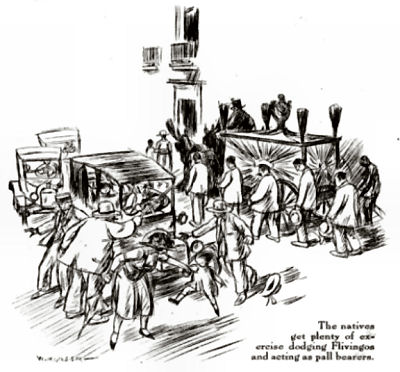Walter Winchell? Michael Todd? Rose Bigman? Helene Hanff? Richard Rodgers?
Question for Quote Investigator: The most famous review in Broadway history is also the most controversial, and I hope you can help solve the following mystery.
In 1943 a hardworking theater group in New Haven, Connecticut was trying to prepare a major musical so that it could move to Broadway. The production was called “Away We Go!” and the local audience was welcoming. But an important visitor from New York saw the show and was decidedly unenthusiastic. The women in the cast wore appropriate period costumes, long dresses. The reviewer thought that the display of feminine pulchritude was fundamental to success, so the following devastating one-line analysis was communicated to New York:
No legs; No jokes; No chance!
A major investor threatened to drop out, but the company persevered. When the production was transferred to Broadway it had a new title: “Oklahoma!” and box-office records were smashed. “Oklahoma!” became the longest running and most successful musical of its era.
However, this popular Broadway legend has more than one version because the identity of the New York visitor is uncertain. Some say that the influential producer Mike Todd created the inaccurate review. Others say that Rose Bigman heard the statement or composed the statement and sent it via telegram to New York. She was the right-hand assistant of Walter Winchell the most powerful newspaper columnist and radio commentator of the period. The legend says Winchell published the now infamous appraisal in his widely distributed column. Another scandalous tale says the true unexpurgated comment was “No tits; No jokes; No chance.” What do you think?
Reply from Quote Investigator: The New Haven premiere of “Away We Go!” occurred on March 11, 1943. Some references claim that the lacerating evaluation was published shortly after this performance, but QI has been unable to find any evidence supporting this claim.
The Broadway production with the updated title “Oklahoma!” opened on March 31, 1943. Three months later, on June 24, 1943, Walter Winchell’s syndicated column was printed in the Augusta Chronicle with the following comment about the musical which was already a triumph. Note that the repeated dots in this text are part of Winchell’s writing style and do not represent an ellipsis:1
The success of “Oklahoma” still is Broadway tabletalk. …The musical was “a sleeper.” …There was no advance gab about it. ..None of the usual excitement of a Theatre Guild first night …Even the ticket brokers were unimpressed after witnessing it at New Haven. One spec summed up this way: “No jokes, no legs, no chance!”
This is the earliest instance of the well-known remark that QI has located. Note that the first two elements, “No jokes” and “No legs”, are swapped when compared to the most common modern version.
Clearly, Winchell was not attacking the play in this piece; instead, he was criticizing a wildly inaccurate prediction. Also, he did not publicly attach a name to the harsh statement. The next week, on June 29th, Winchell printed a humorous and joyful follow-up response from a member of the theater company:2
The quip here about “Oklahoma” being unappreciated during the try-outs and a N.Y. ticket spec summing up: “No jokes, no legs, no chance!” is topped by Jean Roberts of the cast .. “And now,” she telegraphs, “no tickets!”
More than a decade later in 1957 the notable Broadway press agent Richard Maney wrote about the early reception of “Oklahoma!” In one sentence he presented Mike Todd’s negative opinion of the show. In the immediately succeeding sentence he mentioned the notorious phrase which he attributed to a “Broadway ticket broker”. In a third sentence he listed the critique of theater owner Lee Shubert. A rapid reader might have connected the key comment to Todd instead of an anonymous ticket broker.3 In the following excerpt Lindy’s referred to a popular New York City restaurant:4
“Are they going to ask $3.60 for that?” jeered Michael Todd, even then identified as a genius by the illuminati in Lindy’s. “No legs, no jokes, no chance!” was the verdict of a Broadway ticket broker credited with occult powers. Lee Shubert frowned on the proceedings. No musical could prosper in which a character was killed, he said.
In 1960 a columnist named Harlowe R. Hoyt writing in the Cleveland Plain Dealer attributed the remark directly to producer Mike Todd:5
And the late Mike Todd jeered “Oklahoma” with: “No legs, no jokes, no chance.”
Starting in 1961 two strongly conflicting accounts about this episode in musical history emerged. One account was outlined by a publicist for “Oklahoma!” named Helene Hanff in an article published in Harper’s Magazine in March 1961. Another version was given by Walter Winchell in a series of rebuttals printed in his column and in his memoir. Here are additional selected citations in chronological order.
Continue reading “Quote Origin: No Legs, No Jokes, No Chance!”